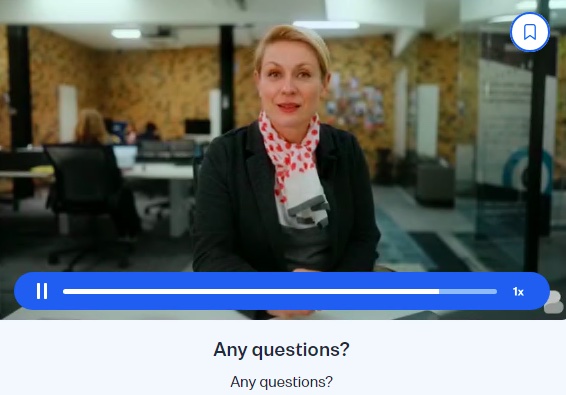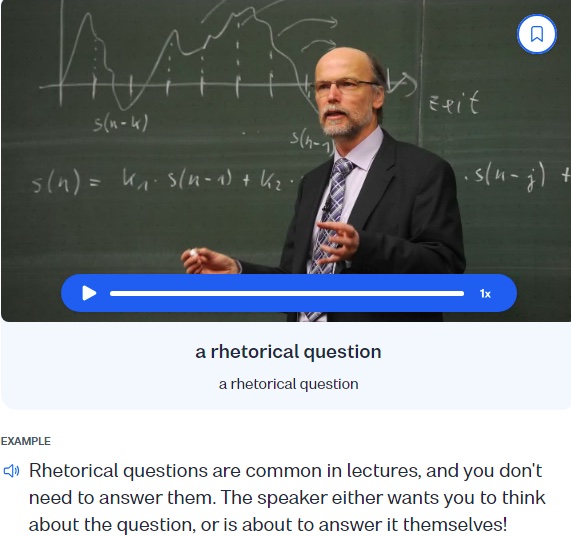Boost your English Skills with Rhetorical Questions
Rhetorical questions are a great way to add impact, emotion, and persuasiveness to your English
I want to learn...
Sometimes in English, a question isn’t really a question. I know, I know — this sounds stupid. But hear me out. Sometimes we ask a question, but we don’t want an answer. Instead, we want to create an effect.
These questions but not questions are called rhetorical questions and you can find them everywhere, from daily conversations and popular culture to literature and political speeches. Read on to learn all about rhetorical questions with a bunch of examples.
What are rhetorical questions?
A rhetorical question is a question asked to make a point or create an effect rather than to get an answer.
Let’s picture the scene. You’re at the beach with your friend. You’re up to your knees in seawater and looking west toward a beautiful sunset. The sky is a gradient ranging from deep purples to warm yellows, reds, and oranges, and you turn to your friend and ask, “Isn’t this incredible?”
You don’t need an answer (you already know it’s incredible). You use the rhetorical question to make a point about how much you’re enjoying the sunset. The rhetorical question — one of many figures of speech — emphasizes the beauty of the sunset and the moment.
So, why do people use rhetorical questions (like this one)? Rhetorical questions:
- Increase impact and persuasiveness to speeches and written texts.
- Make readers (or listeners) think and engage with your message.
- Emphasize ideas or opinions, making them more memorable.
- Express emotions like surprise and frustration.
- Add humor to situations.
Different types of rhetorical questions
Here are the three kinds of rhetorical questions:
1. Hypophora
Also known as anthypophora, hypophora is when you ask a question but answer it yourself. You can use it to catch attention, change the subject, or introduce new questions to your audience.
Here’s an example from the author Kurt Vonnegut:
“What should young people do with their lives today? Many things, obviously. But the most daring thing is to create stable communities in which the terrible disease of loneliness can be cured.”
2. Epiplexis
This is when you use a rhetorical question to scald or show your unhappiness with someone’s behavior.
Here’s an example you might hear a teacher say to a naughty student: “You didn't do your homework again?”
3. Erotesis
This is a rhetorical question that implies a strong answer (usually negative but could be positive).
Here’s an example an angry coach might say at halftime:
“Do you want to lose?”
Rhetorical questions examples from everyday language
In daily conversation, rhetorical questions add emotion, emphasis, and humor. Let’s look at some examples.
1. "Do I look like I was born yesterday?"
By asking this rhetorical question, you’re saying “I’m not stupid enough to believe that.” You can use this when you think someone is trying to trick you, is being dishonest, or not telling the whole truth.
2. "Do I look like a bank?"
Use this rhetorical question in response to someone asking you for money or favors. It shows you’re not always financially able to help.
3. "Isn't this a fine mess?"
Use this rhetorical question when you’re in a complicated or difficult situation. After things have gone wrong, you can use it to point out the difficulties.
4. "What's up?"
“What’s up?” (and “Alright?” in UK English) are greetings like “How are you?” but they don’t need a response.
5. "Do I look like a mind reader?"
This rhetorical question works well when there’s been a miscommunication. It means “If you don’t tell me, I can’t know what you think, want, or expect.”
6. "Who cares?"
Use this rhetorical question when you want to show you don’t care — or are not interested — in the topic.
7. "Is the Pope Catholic?" or "Can fish swim?"
These are humorous rhetorical questions you can use when someone asks you an obvious question. They're a way of saying “Of course. That’s a stupid question.”
8. "Need I say more?"
You can use this at the end of an argument. It means you have given enough information or evidence and you won’t continue because your points are clear.
9. "Who knows?"
This is a useful rhetorical question when you can’t predict how something will happen, or understand why something happened. It’s a way of showing you think the answer is unknowable.
10. Are you listening?
Use this rhetorical question to grab your listener’s attention and emphasize the importance of your point. It’s also useful when you think people are not listening as it helps to re-engage them.
4. Are you stupid?
This rhetorical question is a way of showing you think someone did something stupid or dangerous. It also makes it clear to your listener that you think they made a mistake. But, importantly, it’s not as rude as directly saying “You’re stupid.”
Examples of rhetorical questions from popular culture
Rhetorical questions are common in popular culture too. Let’s look at some examples:
Rhetorical questions from TV series
The character from the hit sitcom, Friends, used rhetorical questions for humor. Here are some examples of jokes made from rhetorical questions.
-
Ross: "I went to that tanning place your wife suggested." Chandler: "Was that place the sun?"
-
Chandler: "If I were a guy and … did I just say, 'If I were a guy'?"
-
Joey: “What's not to like? Custard? Good. Jam? Good. Meat? GOOOOD!”
-
Joey: Look at me. I'm Chandler. Could I BE wearing any more clothes?
Rhetorical questions in movies
Rhetorical questions are common in movies too. Here are some examples:
- The cowardly lion in The Wizard of OZ (1939) said:
“What makes a King out of a slave? Courage.
What makes the flag on the mast to wave? Courage.”
- Travis Bickle in 1976’s Taxi Driver says while talking to himself in a mirror:
“You talkin' to me? You talkin' to me? You talkin' to me? Then who the hell else are you talkin' to? You talkin' to me? Well, I'm the only one here. “
Rhetorical question examples from political speeches
Rhetorical questions are common in political speeches too. Here are some famous examples.
1. President Obama's Immigration Address (2014)
In this speech, President Obama used rhetorical questions to highlight the contradictions and moral challenges in the US's immigration system. He asked:
"Are we a nation that tolerates the hypocrisy of a system where workers who pick our fruit and make our beds never have a chance to get right with the law? Are we a nation that accepts the cruelty of ripping children from their parents' arms? Or are we a nation that values families, and works to keep them together?"
2. Winston Churchill's "We Shall Fight on the Beaches" Speech (1940)
In his famous speech, Churchill used rhetorical questions to emphasize Britain's determination to continue fighting against Nazi Germany, asking:
"Can you conceive a greater objective for the Germans in the air than to make evacuation from these beaches impossible, and to sink all these ships which were displayed, almost to the extent of thousands? Could there have been an objective of greater military importance and significance for the whole purpose of the war than this?"
3. Martin Luther King Jr.'s "I Have a Dream" Speech (1963)
In his iconic speech, Dr. King used rhetorical questions to emphasize the ongoing struggle for civil rights and justice. He said:
“There are those who are asking the devotees of civil rights, when will you be satisfied? We can never be satisfied as long as the Negro is the victim of the unspeakable horrors of police brutality. We can never be satisfied as long as our bodies, heavy with the fatigue of travel, cannot gain lodging in the motels of the highways and the hotels of the cities.”
Rhetorical question examples from literature
Finally, we have literature. Authors use rhetorical questions to create an effect in their work. Let’s look at some examples.
1. The Merchant of Venice, William Shakespeare
In this example, Shakespeare uses rhetorical questions to highlight inequalities and discrimination:
“Hath not a Jew eyes? Hath not a Jew hands, organs, dimensions, senses, affections, passions? Fed with the same food, hurt with the same weapons, subject to the same diseases, healed by the same means, warmed and cooled by the same winter and summer as a Christian is? If you prick us, do we not bleed? If you tickle us, do we not laugh? If you poison us, do we not die? And if you wrong us, shall we not revenge?”
2. Catch-22 (1961), Joseph Heller
In this example, Heller uses rhetorical questions to emphasize the stupidity of war:
“Yossarian attended the educational sessions because he wanted to find out why so many people were working so hard to kill him. A handful of other men were also interested, and the questions were many and good when Clevmger and the subversive corporal finished and made the mistake of asking if there were any.
'Who is Spain?'
'Why is Hitler?'
'When is right?'
'Where was that stooped and mealy-colored old man I used to call Poppa when the merry-go-round
broke down?'
'How was trump at Munich?'
'Ho-ho beriberi.'
And
'Balls!'
all rang out in rapid succession, and then there was Yossarian with the question that had no answer: 'Where are the Snowdens of yesteryear?'
The question upset them, because Snowden had been killed over Avignon when Dobbs went crazy in mid-air and seized the controls away from Huple.”
Add some effect to your English with rhetorical questions
Rhetorical questions are a great way to increase the impact of your English. They make you more persuasive and engage your audience. You can also use them to emphasize your ideas and opinions and to express emotions. Try and use some rhetorical questions in your conversations or writing. But don’t overdo it. Use them now and then to make a point. Any more than that and your audience might become annoyed.
Master English with Busuu
With Busuu, you're just a few swipes away from millions of Native English speakers to interact with. Join our community, complete free English courses, and develop your English skills. All on your mobile device.

